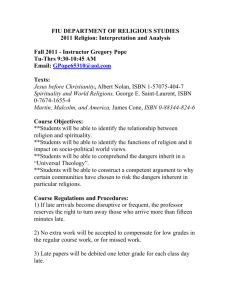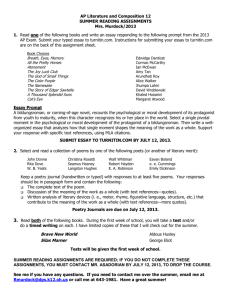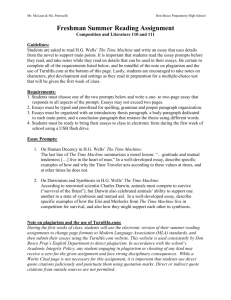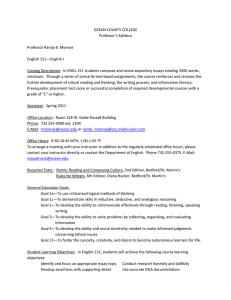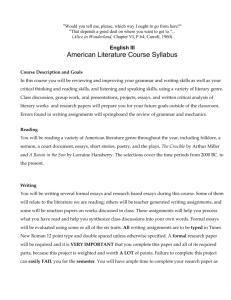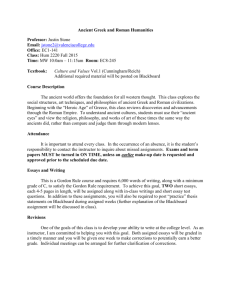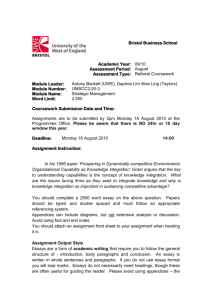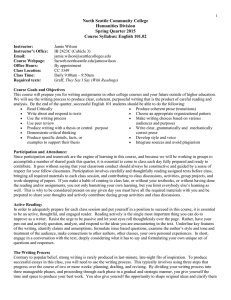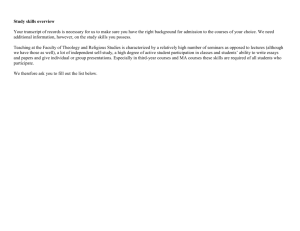Global logistics and Supply Chain Management
advertisement
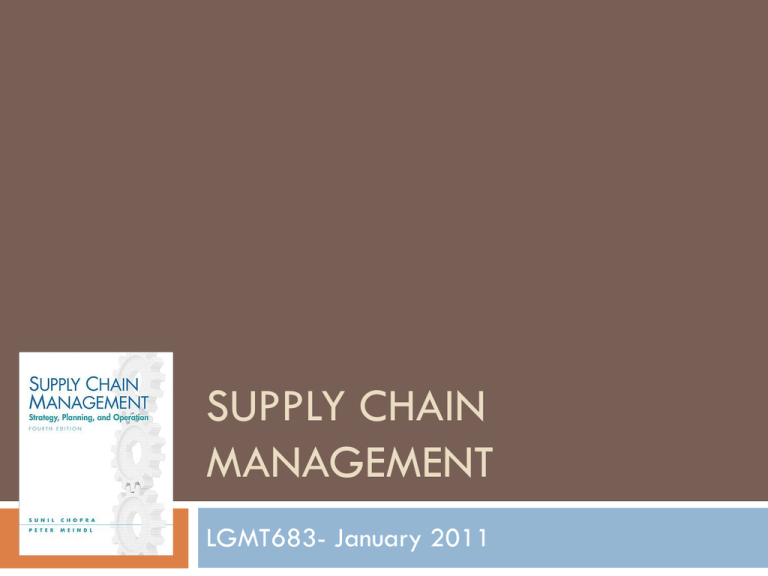
SUPPLY CHAIN MANAGEMENT LGMT683- January 2011 Syllabus Schedule Text Description Grading Assignments Honesty and Integrity Attendance Preparation and participation Schedule Group Project Student Essays Schedule Wednesday from 6:15 until 11:00pm (Eastern) Last class: March 9, 2011 Class conflict: March 9, 2011… like to do it on March 11, 2011 (if everyone is available) Text Chopra, S. & Meindal, P. (2010). Supply Chain Management: Strategy, Planning, and Operation (4nd Ed.). Upper Saddle River, NJ: Prentice Hall. ISBN13: 987-0-13-608040-4. Description The focus of this course is on supply chain management. Topics include the evolution and objective of supply chain management; the major stages and processes involved in planning and managing supply chains; and why the concept of strategic fit is so important to supply chain managers. Successful students will also understand the major drivers of supply chain performance; key metrics for managing performance; and how to plan and forecast demand under conditions of uncertainty to meet desired customer service levels. This course also addresses the purpose and content of the Supply Chain Operations Reference (SCOR) Model. Case studies and problems are used throughout the course to highlight important principles and best practices in supply chain management. Grading Class Participation and Involvement Group Project Paper Individual Presentation Homework Mid-Term Exam Final Exam Total 10 % 10 % 10% 5% 15 % 25 % 25 % 100% Assignments All assignments will be completed in a professional manner and on time, unless prior arrangements have been made with the professor. Honesty and Integrity 1. Plagiarism: Presenting as one’s own the ideas, words, or products of another. Plagiarism includes use of any source to complete academic assignments without proper acknowledgement of the source. All papers submitted for grading in this course may be submitted to Turnitin.com where the text of the paper is compared against information contained in the Turnitin.com database. Papers submitted will also be included in the Turnitin.com database and become source documents for the purpose of detecting plagiarism. 2. Cheating: A broad term that includes the following: a. Giving or receiving help from unauthorized persons or materials during examinations. b. The unauthorized communication of examination questions prior to, during, or following administration of the examination. c. Collaboration on examinations or assignments expected to be individual work. d. Fraud and deceit, that include knowingly furnishing false or misleading information or failing to furnish appropriate information when requested, such as when applying for admission to the University. Attendance All absences, regardless of reason, require a makeup assignment, mutually arranged between the instructor and the student. If an absence is anticipated, the student should notify the instructor, preferably in advance. Watching the recording does not count towards attendance. Preparation and participation As a MINIMUM, all students are EXPECTED to have READ and thought about the information provided in the assigned chapters BEFORE class commences. This is a professional responsibility to yourself and your classmates. Active participation in class discussions is an important element of a collegiate program; it is evaluated by instructors and is reflected in the assignment of course grades. Schedule One chapter a week. Weekly homework assignment (very math based). Two exams (week 5 and 9). Group Project The group project will give you the opportunity to examine current research in the area of global logistics. Each group will be given a chapter that they will need to present to the class. Additionally, they will need to give additional information from a scholarly article. 30 minute PowerPoint presentation (Turned in at least 24 hours before your presentation). Student Essays The topic of the student essay is "The Future of Supply Chain Management." Appropriate essays could be a general summary of the future of Supply Chain Management or an in-depth examination of an aspect of Supply Chain Management (such as forecasting, supply chain networks, or ebusiness.) The requirements of the essay include: Formatted in APA. Minimum of 7 pages. The 7 pages includes: 1 cover page, 1 abstract page, 4 essay pages, and 1 reference page. Minimum of 3 references. Two of the references must be scholarly articles published after 2005. PowerPoint presentation. The last day of class you will present your essay to the class. The PowerPoint presentation needs to be turned in to me at least 24 hours prior to the presentation date. Note: the presentation will not just be the reading of your essay. Introductions Name Where do you live? What do you do for a living? What was your undergraduate degree? How long have you been working on your ERAU graduate degree? What degree are you working towards? What is your logistics experience? Groups tbd
